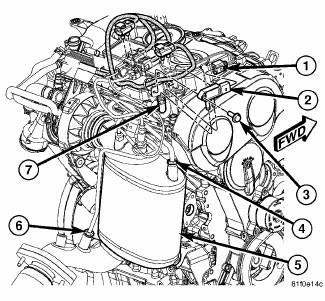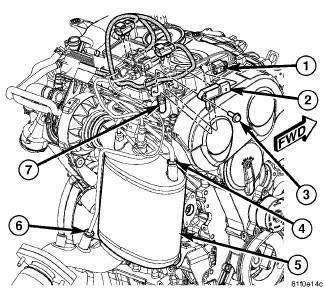Dodge Journey: Sensor, exhaust pressure
REMOVAL
EXHAUST PRESSURE SENSOR

Fig. 42: DPF Components
- - ELECTRICAL CONNECTOR
- - PRESSURE DIFFERENTIAL SENSOR
- - MOUNTING BOLT
- - UPSTREAM PRESSURE TUBE
- - DPF
- - DOWNSTREAM PRESSURE TUBE
- - TUBING
INSTALLATION
EXHAUST PRESSURE SENSOR

Fig. 43: DPF Components
- - ELECTRICAL CONNECTOR
- - PRESSURE DIFFERENTIAL SENSOR
- - MOUNTING BOLT
- - UPSTREAM PRESSURE TUBE
- - DPF
- - DOWNSTREAM PRESSURE TUBE
- - TUBING
1. Install tubing (7) on pressure differential sensor (2).
2. Position pressure differential sensor (2) and tubing (7).
3. Install pressure differential sensor mounting bolt (3). Tighten to 10 N.m (89 in. lbs.).
4. Install downstream pressure tube (6) into catalytic converter. Tighten the fitting to 10 N.m (89 in. lbs.).
5. Install upstream pressure tube (4) into catalytic converter. Tighten the fitting to 10 N.m (89 in. lbs.)
6. Position electrical connector (1) into bracket.
7. Connect negative battery cable.
 Installation
Installation
2.7L ENGINE
Fig. 32: Maniverter To Cross Under Fasteners
1. Install the cross under pipe (3). and the front maniverter-to-cross under
fasteners (1) and (2). Tighten to
27 Nm (20 ft. lb.).
Fi ...
 Sensor, exhaust temperature
Sensor, exhaust temperature
REMOVAL
EXHAUST TEMPERATURE SENSOR
Fig. 44: Exhaust Temperature Sensor
- DPF TEMPERATURE SENSOR ELECTRICAL CONNECTOR
- DPF TEMPERATURE SENSOR
1. Remove engine cover.
2. Disconnect and ...
See also:
VEHICLE IDENTIFICATION NUMBER
The Vehicle Identification Number (VIN) is on the left
front corner of the instrument panel and is visible from
outside of the vehicle through the windshield. This
number also appears on the Automo ...
Description
Fig. 161: Rear Heater AC Housing Description
Models with the rear heating-A/C system use a rear heater-A/C housing (1)
that combines A/C and heating
capabilities into a single unit mounted withi ...
Removal
WARNING: Disable the airbag system before attempting any steering
wheel, steering
column, or instrument panel component diagnosis or service. Disconnect
and isolate the battery negati ...
